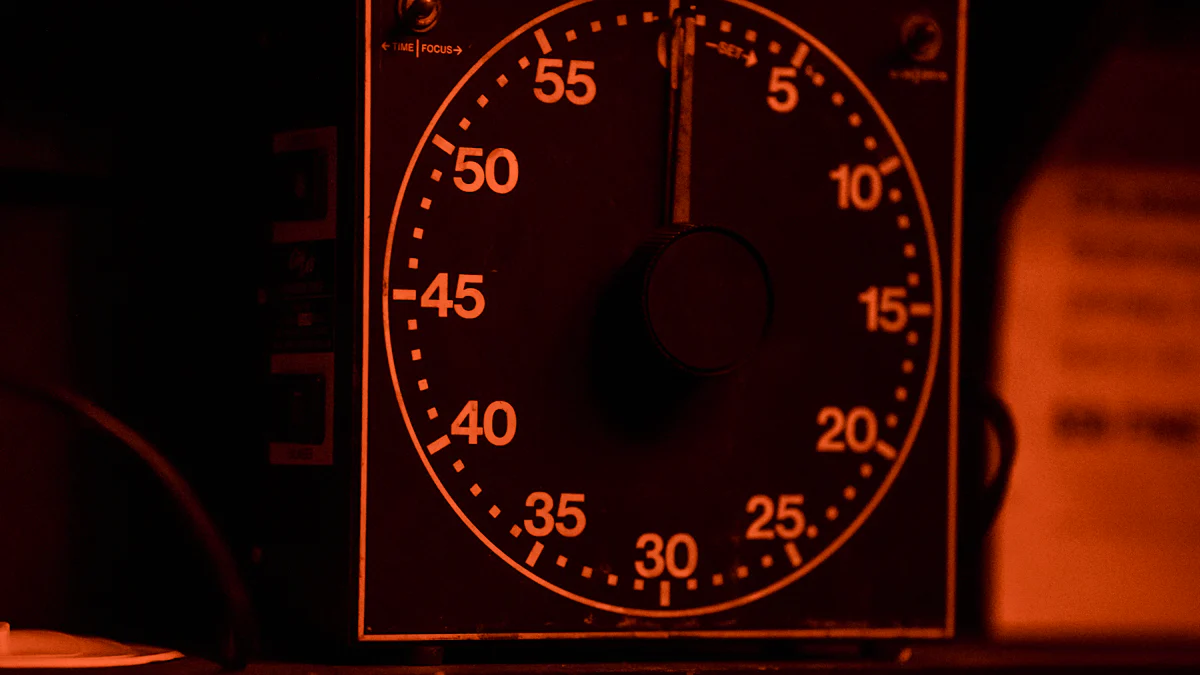Discover the Power of Ip4 Digital Timer in Industrial Automation

Introduction to Ip20 Digital Timers
In the rapidly evolving landscape of industrial automation, the demand for precise and efficient timing solutions has been on the rise. The digital timer market is projected to grow at a CAGR of 11.7% during the forecast period, indicating a positive outlook for the market with increased demand and adoption expected in various industries and households.
Understanding the Basics
The digital timer market has been experiencing significant growth in recent years, driven by factors such as increasing awareness and adoption of smart home automation systems, the rise in industrial automation, and the need for precise timing in various industries. These timers allow the setting of four separate channels simultaneously in any combination of countdown or count-up (stopwatch), providing versatile functionality for diverse applications.
The Importance in Industrial Automation
As industries embrace automation, digital timers play a crucial role in automating processes, controlling equipment, managing lighting schedules, saving energy, and increasing efficiency. They are utilized across various sectors such as manufacturing, healthcare, transportation, agriculture, and more where precise timing and automation are essential to enhance productivity and convenience.
The electronic cumulative timer market is also expected to witness robust growth due to increasing demand for accurate time tracking and scheduling purposes. This growth is further fueled by advancements in technology that make electronic cumulative timers more versatile and feature-rich.
Overall, the industrial timers market is poised for significant growth driven by technological advancements, increasing industrial automation, and a growing focus on operational efficiency across various industries.
Exploring the Features of Programmable Programable Digital Timer

In the realm of industrial automation, Programable Digital Timer stand out as versatile and efficient tools that offer a wide array of features to enhance operational control and precision timing.
Programmable Digital Timer: Flexibility at Its Finest
Setting Up for Efficiency
One of the key advantages of programmable digital timers lies in their ability to be customized for specific industrial processes. Unlike traditional analog timers, which have limited flexibility, programmable digital timers can be easily configured to accommodate various timing requirements. This adaptability allows industrial operators to fine-tune timing parameters according to the unique needs of their equipment and production schedules, ultimately leading to enhanced operational efficiency.
Digital Timer With Display: Clear and User-Friendly
Another standout feature of programmable digital timers is their clear and user-friendly display interface. The digital format provides easy-to-read screens that allow operators to monitor and adjust timing settings with precision. This visual clarity ensures that timing parameters are readily accessible, contributing to streamlined operations and minimizing the risk of errors.
Ip20 Digital Timer: Designed for Industrial Use
Durability and Reliability
The Ip20 digital timer is specifically engineered to withstand the rigors of industrial environments, offering durability and reliability in demanding settings. With an IP20 rating, these timers are protected against solid objects larger than 12mm, making them suitable for deployment in industrial facilities where robust performance is essential. The durability of Ip20 digital timers ensures consistent operation even in challenging conditions, providing a dependable timing solution for industrial automation applications.
Integration with Industrial Systems
An essential aspect of Ip20 digital timers is their seamless integration with diverse industrial systems. These timers can be effortlessly incorporated into existing infrastructure, including control panels, machinery, and production lines. Their compatibility with industrial systems allows for cohesive automation processes, enabling precise timing control over critical operations such as motor activation/deactivation, lighting management, and equipment synchronization.
The transition from traditional analog timers to advanced programmable digital solutions represents a significant leap forward in enhancing operational efficiency and precision timing within industrial settings.
The Role of Schneider Electric Egypt in Advancing Digital Timers
Schneider Electric Egypt has been at the forefront of pioneering innovations in digital timer technology, driving advancements that have significantly impacted industrial automation and control systems.
Schneider Electric Egypt: Pioneering Innovations
Sarah Bedwell, Project Manager at Schneider Electric, emphasized the company's contributions to industrial automation through the development of cutting-edge digital timer solutions. She highlighted how Schneider Electric Egypt has been instrumental in introducing advanced ACOPOSinverter technology, which has revolutionized timing precision and control in industrial settings. According to Sarah, "Our focus on custom solutions tailored to the specific needs of industries has allowed us to drive innovation and address unique challenges faced by our clients."
In line with this commitment, Anna Usewicz, Product Design Engineer at Schneider Electric, provided insights into the company's role in advancing digital timer technology. She explained how Schneider Electric Egypt has continuously invested in research and development to enhance the functionality and performance of digital timers. Anna stated, "Our team's dedication to pushing the boundaries of digital timer technology has resulted in solutions that offer unparalleled reliability and precision, meeting the evolving demands of industrial automation."
Contributions to Industrial Automation
Schneider Electric Egypt's contributions to industrial automation extend beyond technological advancements. The company has actively collaborated with industrial partners to integrate digital timers into diverse applications, ranging from manufacturing processes to energy management systems. This collaborative approach has facilitated seamless integration of Schneider Electric Egypt's digital timers, contributing to improved operational efficiency and enhanced productivity across various industries.
Custom Solutions for the Egyptian Market
Palak Lad, Systems Engineer at Schneider Electric, shed light on the company's commitment to providing custom solutions tailored specifically for the Egyptian market. Palak emphasized how Schneider Electric Egypt's localized approach has enabled them to address industry-specific requirements effectively. "By understanding the unique challenges faced by Egyptian industries," Palak stated, "we have been able to develop bespoke digital timer solutions that align with local regulations and operational standards, ensuring optimal performance and reliability."
The Future of Digital Timers with Schneider Electric
Looking ahead, Schneider Electric Egypt is dedicated to driving sustainable and efficient solutions through its innovative digital timer technologies. The company remains committed to enhancing industrial productivity while prioritizing sustainability initiatives.
Sustainable and Efficient Solutions
Schneider Electric Egypt is actively pursuing sustainable practices in its digital timer offerings, integrating energy-efficient features that align with global environmental standards. By leveraging advanced technologies such as ACOPOSinverter, Schneider Electric Egypt aims to deliver sustainable solutions that optimize energy usage while maintaining precise timing control in industrial automation applications.
Enhancing Industrial Productivity
The future roadmap for Schneider Electric Egypt focuses on further enhancing industrial productivity through advanced functionalities integrated into their digital timers. By leveraging data-driven insights and predictive maintenance capabilities, these next-generation solutions aim to empower industries with greater operational visibility and control.
Analog Mechanical Weekly Time vs. Ip20 Digital Timers

In the realm of timing solutions, the comparison between analog mechanical weekly time switches and Ip20 digital timers reveals distinct characteristics that cater to different industrial needs.
Analog Mechanical Weekly Time: A Traditional Approach
The analog mechanical weekly time switch represents a traditional method of scheduling and controlling electrical equipment. These devices operate through a series of mechanical components, utilizing clockwork mechanisms to regulate the timing of electrical circuits based on preset schedules.
The Basics of Mechanical Weekly Time Switch
Analog mechanical weekly time switches are characterized by their reliance on physical gears and rotating dials to manage timing functions. This classic approach has been widely used in various industrial settings, offering a simple yet effective means of automating repetitive tasks based on weekly schedules.
Limitations in Modern Industrial Settings
Despite their historical significance, analog mechanical weekly time switches face limitations when applied in modern industrial environments. Their manual setup and limited programming options make them less adaptable to dynamic production requirements, hindering their ability to meet the evolving demands of advanced industrial automation systems.
Advantages of Ip20 Digital Timers Over Analog
Digital timers offer increased accuracy, advanced programming options, and automated functionalities compared to analog mechanical timers. Users have reported digital timers to be a night-and-day improvement over analog timers in terms of reliability and performance.
Increased Accuracy and Reliability
Ip20 digital timers are renowned for their precision timing capabilities, providing accurate control over industrial processes with minimal margin for error. Unlike analog counterparts that may experience deviations due to wear and tear, digital timers maintain consistent accuracy throughout their operational lifespan, ensuring reliable performance in critical applications.
Advanced Features and Flexibility
The versatility of Ip20 digital timer is exemplified through their advanced programming features, enabling users to create intricate timing sequences tailored to specific operational requirements. With programmable functionality and automated scheduling options, these digital timers empower industrial operators with greater flexibility in managing complex timing tasks while adapting seamlessly to changing production dynamics.
Digital timers are electronic devices that display time in digital format, offering precise measurements with easy-to-read screens. They are widely used in various industries for accurate time tracking and scheduling purposes.
Conclusion
In summary, the Ip20 digital timers offer a host of benefits that cater to the evolving needs of industrial automation and control systems. With their precision timing capabilities, versatile programming options, and seamless integration with industrial infrastructure, these digital timers have emerged as indispensable tools for enhancing operational efficiency and productivity in diverse industrial settings.
The future of industrial automation holds promising prospects for the continued growth and adoption of Ip20 digital timers. As highlighted by industry experts, the market outlook for digital timers is strong, driven by increasing demand across various industries such as manufacturing, healthcare, transportation, and smart home automation systems. The projected growth is further bolstered by advancements in tech innovations like IoT integration and wireless connectivity. Additionally, the rising focus on energy conservation and sustainability is expected to drive the adoption of digital timers for automated energy management.
Furthermore, user testimonials underscore the practical benefits of Ip20 digital timers, emphasizing their role in addressing specific challenges and delivering efficient solutions. For instance, one user expressed how a 4-Button Digital Timer provided a total solution for managing exhaust fan usage at home, effectively saving energy and preventing moisture damage.
As industries continue to embrace automation and seek precise timing solutions, Ip20 digital timers are poised to play an increasingly pivotal role in driving operational excellence and sustainable practices. Their advanced features align with the demands of modern industrial environments, offering scalable controllers suitable for diverse applications while ensuring reliability and performance.
The future trajectory of industrial automation will undoubtedly be shaped by innovative technologies such as Ip20 digital timers, paving the way for enhanced efficiency, streamlined operations, and sustainable resource management.
See Also
Selecting the Perfect Hook and Loop Tape for Your Project
The Key to Successful Range Finding: Gabbay's Solution for Precision Shooting

